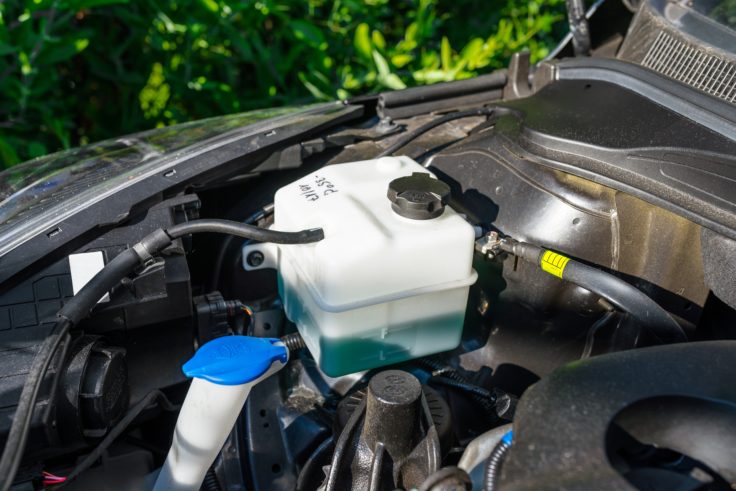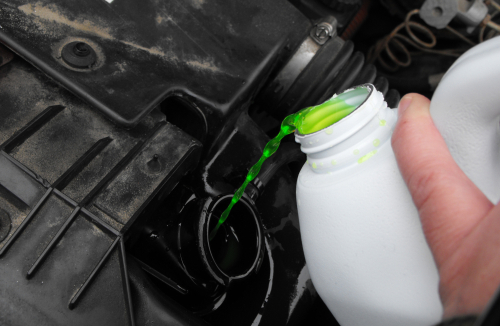What Does Antifreeze Smell Like
Antifreeze has a sweet smell similar to maple syrup. The odor is distinctive and easily recognizable.
Antifreeze is a crucial component in the cooling systems of vehicles. Despite its practical use, it can pose a significant risk if ingested due to its toxic nature. Understanding the smell of antifreeze is vital for early detection of leaks and preventing potential hazards.
The distinct sweet aroma it emits is a key indicator that there could be a leak in the cooling system, prompting immediate action to avoid any harmful consequences. We will delve deeper into the characteristics of antifreeze, its odor, and the importance of addressing any issues related to its smell promptly.
The Smell Of Antifreeze
When it comes to identifying antifreeze, one of the most notable characteristics is its distinct odor. The smell of antifreeze is unmistakable and can serve as a warning sign that there may be an issue with your vehicle’s cooling system. Understanding the smell of antifreeze and its chemical composition can help you diagnose problems and take appropriate action. Let’s explore the chemical composition of antifreeze and the distinct odor that it emits.
Chemical Composition Of Antifreeze
Antifreeze, also known as coolant, is a liquid solution that helps regulate the temperature in a vehicle’s engine. It is typically a mixture of ethylene glycol or propylene glycol, water, and other additives. These additives can include corrosion inhibitors, dispersants, and lubricants to enhance the performance and longevity of the coolant.
The primary ingredient in antifreeze, either ethylene glycol or propylene glycol, is what gives it its unique odor. Ethylene glycol has a slightly sweet smell, while propylene glycol has a less pronounced odor. Both of these compounds have a lower freezing point than water, allowing them to prevent the coolant from freezing in cold temperatures.
Distinct Odor Of Antifreeze
One of the key characteristics of antifreeze is the distinct odor it emits. The smell is often described as sweet or slightly pungent, but it can vary depending on the specific formulation and composition of the coolant. This odor is caused by the presence of ethylene glycol or propylene glycol in the mixture.
The distinct smell of antifreeze is crucial for identifying potential issues with the cooling system of your vehicle. If you detect a sweet or pungent odor, it could indicate a coolant leak or a malfunctioning engine. Addressing these issues promptly can prevent serious damage to your vehicle and ensure its proper functioning.
It is important to note that while the smell of antifreeze can be helpful in diagnosing problems, it should never be directly inhaled or ingested. Ethylene glycol, one of the primary ingredients in antifreeze, is toxic and can be harmful if ingested. If you suspect a coolant leak or have concerns about your vehicle’s cooling system, it is best to consult a professional mechanic.
By understanding the chemical composition and distinct odor of antifreeze, you can better identify potential issues with your vehicle’s cooling system. The smell of antifreeze serves as a warning sign, urging you to address any problems promptly. If you detect a sweet or pungent odor, it may be time to seek professional assistance to ensure the proper functioning of your vehicle.

Credit: www.way.com
Health Effects Of Inhaling Antifreeze Odor
Inhaling the odor of antifreeze can have serious health effects. It is important to be aware of the immediate symptoms and long-term health risks associated with exposure to the smell of antifreeze.
Immediate Symptoms
- Headache
- Dizziness
- Nausea
Long-term Health Risks
- Damage to the central nervous system
- Liver and kidney damage
- Respiratory issues
Identifying Antifreeze Leaks By Smell
Antifreeze has a distinct odor that can help you identify potential leaks in your vehicle. Understanding what antifreeze smells like is crucial in spotting issues early and preventing costly repairs. Identifying Antifreeze Leaks by Smell is a simple yet effective way to ensure your vehicle’s health.
Recognizing The Odor
- Antifreeze often smells sweet and syrupy, resembling the aroma of maple syrup.
- If you notice a sweet smell coming from your car, it could be a sign of an antifreeze leak.
Differentiating From Other Smells
- It is important to distinguish the antifreeze smell from other car odors to accurately identify leaks.
- Gasoline and oil smells are distinctly different from antifreeze, helping you pinpoint the source of the leak.

Credit: carfromjapan.com
Precautions And Safety Measures
When dealing with antifreeze, it is crucial to prioritize safety and take the necessary precautions. Understanding the potential hazards associated with antifreeze is essential for both personal safety and the well-being of the environment. In this section, we will discuss two important safety measures, including adequate ventilation and the use of protective gear, as well as the importance of consulting a professional.
Ventilation
Proper ventilation is imperative when working with or near antifreeze. The fumes released by antifreeze can be harmful if inhaled in large quantities. Therefore, it is crucial to always work in well-ventilated areas, preferably outdoors or in areas with open windows and good airflow. If you are working in a confined space, using exhaust fans or wearing respiratory masks can help minimize the risk of inhaling toxic fumes.
Protective Gear
Wearing appropriate protective gear is another crucial aspect of ensuring safety when handling antifreeze. The following protective gear should be worn:
- Gloves: Always wear chemical-resistant gloves to protect your hands from coming into direct contact with antifreeze. This will help prevent skin irritation or potential chemical burns.
- Protective Eyewear: Use safety goggles or a face shield to protect your eyes from any accidental splashes or spills of antifreeze. This will prevent potential eye damage.
- Apron or Protective Clothing: Covering your body with a chemical-resistant apron or protective clothing is important to prevent antifreeze from coming into direct contact with your skin and clothing, reducing the risk of absorption.
- Boots: Wear chemical-resistant boots to protect your feet from accidental spills or splashes of antifreeze.
Consulting A Professional
When it comes to handling antifreeze, it is always advisable to consult a professional, especially if you are unsure or inexperienced. Professionals have the knowledge and expertise to handle antifreeze safely and can guide you through the process. They can provide proper disposal methods and ensure that the environment remains protected from any adverse effects of antifreeze. Seeking professional help not only enhances safety but also minimizes the risk of any legal or environmental issues.
Alternative Antifreeze Options
When choosing an antifreeze for your vehicle, it’s important to consider the alternative options available on the market. These alternatives offer various benefits, such as odorless formulations and eco-friendly compositions. Understanding these options can help you make an informed decision that aligns with your needs and values.
Odorless Antifreeze Formulations
Odorless antifreeze formulations provide a solution for individuals who are sensitive to traditional antifreeze odors. By eliminating the strong smell associated with conventional products, odorless antifreeze enhances the user experience and provides a more pleasant working environment for mechanics and automotive enthusiasts.
Eco-friendly Antifreeze Alternatives
With a growing focus on environmental sustainability, eco-friendly antifreeze alternatives have gained traction in the automotive industry. These products are designed to minimize the impact on the environment while delivering optimal performance for vehicles. By opting for eco-friendly antifreeze, drivers can contribute to reducing their ecological footprint and supporting a more sustainable automotive ecosystem.

Credit: www.kenstrans.com
Frequently Asked Questions For What Does Antifreeze Smell Like
What Does Leaking Antifreeze Smell Like?
Leaking antifreeze can smell sweet and sickly. It may also have a chemical odor. If you notice a strange smell, check for leaks. Promptly addressing leaks can prevent engine damage and potential overheating problems. Always refer to a professional for assistance with any car issues.
Does Antifreeze Smell Like Maple Syrup?
No, antifreeze does not smell like maple syrup.
Does Antifreeze Have An Odor Or Taste?
Antifreeze does have a sweet odor and taste, which can be appealing to pets but toxic.
How Do I Know If My Coolant Is Leaking?
Inspect under the car for puddles or stains, check coolant levels regularly for drops. Look for a sweet smell.
What Does Antifreeze Smell Like?
Antifreeze has a sweet, almost syrupy smell that can be described as sickly-sweet or fruity. It is important to recognize this odor, as it may indicate a coolant leak in your car.
Is The Smell Of Antifreeze Dangerous?
Yes, the smell of antifreeze can be hazardous when inhaled, as it contains toxic chemicals such as ethylene glycol that can be harmful to humans and pets. It is important to address any coolant leaks promptly.
Why Is It Important To Recognize The Smell Of Antifreeze?
Recognizing the smell of antifreeze is crucial as it can alert you to potential coolant leaks in your vehicle, which, if left unaddressed, can lead to serious engine damage and pose health risks.
Conclusion
Antifreeze is an essential component of a vehicle’s cooling system, preventing the engine from freezing or overheating. Understanding its distinctive smell can be crucial for diagnosing potential issues. Remember, an unusual sweet, fruity, or chemical odor could indicate a leak or coolant contamination.
By recognizing the scent of antifreeze, you can swiftly address any problems and ensure your vehicle’s optimal performance and longevity. Stay vigilant, trust your senses, and safeguard your engine’s well-being.

